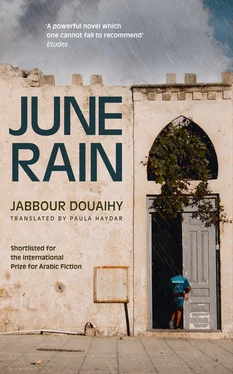He tried his best to stay on the pavement, as he did in the city he had come from. The municipality was in the process of repaving the old streets with black basalt cobblestones thanks to a no-interest loan from the World Bank. He wandered deeper into the streets. The roads became narrower and windier and the scrutiny increased, but Eliyya was not in the least bit concerned.
It was just before noon when he walked slowly by the houses. He stopped suddenly, looked into the open windows, into the rooms. The woman sitting in front of the door, as if to guard it, looked at him. She asked if he was looking for someone. He smiled, remembering.
He used to pass that way on his way home from school. From each of those low doors, a different aroma emanated, helping the children predict what was for lunch. At times they disagreed on what it was, but they always wrinkled their noses in disapproval of bean stew with rice, and held back their strong desire on Fridays to gobble down the fried fish, which their mothers forbade them to eat while it was still too hot. He smiled, trying again after thirty years to determine what was cooking. He stopped in front of a wide-open door, his nose leading him into the clean and tidy interior, and took in a big whiff. Nothing. The aromas must have been more intense when he was younger.
Lunch was always ready when he got home, his mother Kamileh’s lunch, which she spent the whole morning preparing. And preparing food meant cooking, over a continuous fire, cooking with yogurt and rice, because food, as far as Kamileh was concerned, was that which was slurped up hot, with a spoon. Everything else was snack food that didn’t satisfy the heart or fill the belly.
Eliyya would get upset and rebuke her with some sharpness. ‘You just do the cooking. I agreed to that because you’re stubborn. But you should wait for me to get home so I can set the table. That’s my job. You’re not to worry about it.’
Kamileh’s setting the table was something Eliyya just couldn’t tolerate.
He looked at the table.
The artificial bouquet of flowers that had lost its colour over the years was not in the middle of the table where Kamileh assumed she had put it. She must have hesitated over where to place it, feeling around for the right place without success. The plates and silverware were unevenly spaced, and the tablecloth had spots all over it from her missed attempts to fill the water glasses.
‘If I come back tomorrow,’ he threatened, ‘and find the table already set, I’m going to go and eat in a restaurant.’
The boy knew how to hurt his mother when he wanted to.
The next day Eliyya tried to set the table. From the kitchen Kamileh heard the clinking and clanging of the glasses and the spoons. ‘What are you doing?’ she shouted.
He didn’t pay any attention to her. ‘How do you manage to cook?’ he asked her.
‘I know it all by heart. The taste of my cooking hasn’t changed since I began cooking, even after I started losing my vision. You’ll taste these dandelion greens with sautéed onions which I’m sure you haven’t had in twenty years, and you’ll see they taste exactly the same.’
After being cut off from Eliyya all those years, Kamileh could not find a way to demonstrate her motherliness except to treat him as if he were still a child. She behaved as if her son were still the same boy who couldn’t get into a car without her giving the driver an earful about going slowly. And every time Eliyya started to taste a spoonful of his yogurt and kibbeh stew, she warned him it was still hot and to be careful not to burn his throat.
She sat with him at the table without eating.
‘I’ve already eaten,’ she would say if Eliyya asked her to join him.
‘When?’
‘When I was tasting the food as it cooked.’
‘I went to America believing that you never eat.’
Kamileh crossed her arms and listened. Her questions were specific. ‘Is your house there big?’
He smiled.
‘How many rooms?’
‘One room.’
‘One room?’
‘One big room.’
‘Who washes your clothes?’
‘The laundromat.’
‘…’
‘The machine…’
‘Do you eat well?’
‘Just don’t worry about me.’
‘Who cooks for you?’
‘ Le Relais d’Arcachon ,’ he said laughing.
She didn’t understand, nor did she ask.
That was just about everything. The rest was minor detail. She didn’t ask him about marriage.
Now it was his turn to ask questions.
After much hesitation and careful strategising, he posed the question as if it had just come to him.
‘Mother, do we still have anything of my father’s?’
‘Of your father’s?’
‘A picture. Things of his…’
He failed to surprise her. She had been expecting the question, probably from the moment he had returned. She didn’t say a word. Instead, she got up from her chair and went to her room. There was no hesitation in her step. She knew exactly the way to her room, even if she did worry Eliyya’s presence in the house might have caused a piece of furniture to be moved from its place or a chair to be pushed into the hallway. She was afraid she would fall, break some bones and have to depend on others, on some young girl to look after her. She didn’t want anyone staying with her.
She came back with a round wooden box. ‘Here you are,’ she said standing before Eliyya. ‘These are what we found in your father’s pockets when I went with my mother, Muntaha and Hamid al-Semaani to the hospital for him. Take them, they’re yours. Take them with you to the United States if you like.’
‘And the rest of his things?’
She had given his father’s clothes to the poor as everybody there did with the clothes of the deceased. He also had had a deck of cards and some poker chips from the casino which she sent to Fuad and Butros al-Rami, his two gambling partners.
Eliyya was surprised he hadn’t been able to find the box himself. He went into the bedroom and opened it up. There wasn’t much inside: some money, a set of worry beads they’d been told were genuine amber, some papers, among which was a small card with the name of a travelling photographer on it: Nishan Davidian.
He asked about the photographer and was told he had moved to the city a long time ago.
At the café people didn’t ask him much. He sat with them, their faces frowning as if they’d been born that way. They were unemployed, yet some of them wore fancy clothes and Parisian ties. Their cell phones were placed in front of them on the table as they drank coffee and smoked incessantly. They asked him only about his mother’s health and his long stay abroad. Every once in a while he would get a glimpse of a gun at somebody’s waist as they were straightening up or taking some money out of their pocket to pay the shoeshiner who came in to shine their shoes.
They talked about him as soon as he left through the glass door after a useless attempt to pay the tab. They had winked to the waiter in advance not to accept any money from him. Their words were few but their opinions were final. They lived there, in houses they’d inherited from their ancestors. They rarely went into the city, because they had no business there, they would say. And if they decided to go anywhere, it would be only once and to a faraway place, to some town on the banks of the Orinoco River where they would open a shop and sell ready-made clothes and get involved with local women without getting married. It was either live in Karm al-Teen Quarter among brothers and cousins, or in San Felix City near the equator.
Eliyya joined them because someone had told him that the man sitting with them, the one who looked like Luca Brasi in The Godfather and the darkest and grimmest looking one among them, had been with his father when he was killed.
Читать дальше












